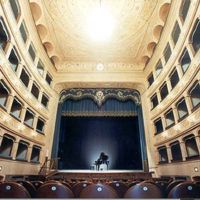Fame is a double-edged sword. (At least, that’s what I’ve heard from famous people) This does not mean, as you’d understandably assume, that it’s twice as good at cutting things as a normal sword; turns out that it means you’re as likely to cut yourself as your target. While fame can help you cut things like lines, it can also leave some pretty bloody wounds on you. Take Ryan Reynolds for example: this past week, his fame got him into a minor altercation with a paparazzo who, finding that sticks and stones may break bones but words do not hurt, chose to run the actor over with his car. Luckily, as Ryan Reynolds is portraying Deadpool and is therefore infused with his powers, the car left not a scratch on our Canadian friend. I theorize that the ratio of a person’s fame to the likelihood of that person being maimed physically or psychologically is pretty direct. You might not agree with my theory, but that’s okay; I know Gioachino Rossini would be into it.

In the role of Green Lantern, Ryan Reynolds gained the ability to be openly mocked by some and ignored by the rest of the world. (Sorry Green Lantern fans)
Rossini’s fame was well established in his day, but he never forgot where he came from. He was born in a fishing village named Pesaro in Italy, situated at the upper calf of his boot-country. He only lived there until he was seven, leaving for Bologna in 1799 with his mother because his father had been arrested for being a Napoleon fanboy. Over the next decade of musical education, Rossini made his name on the back of operas like An Italian Girl in Algiers and Tancredi, the latter becoming so popular that judges had to allegedly stop court proceedings in order to shut up crowds that would spontaneously break into some of its more catchy arias. In 1816, his Barber of Seville really solidified his standing in the operatic world and with that feather in his cap the man took a quick visit in his hometown.

Lawyer: “I move for a recess until the defendant has finished singing ‘Bohemian Rhapsoy'”
Judge: “DENIED. I love this song.”
Likely his visit to Pesaro was to iron out details regarding the Teatro Nuovo that was currently under construction. Rossini was to open the theatre with a revival of The Thieving Magpie in 1818, a great honour that’s up there with being asked to be a god parent or opening a car wash. While there, Rossini made the acquaintance of one Caroline of Brunswick, the 56-year old Princess of Wales and wife of the soon-to-be King George IV, and her lover, the relatively young Bartolomeo Pergami. They were arrogant, ignorant, vulgar, and in the case of Bartolomeo, prone to violence; in short, no one in Pesaro liked Caroline or her boytoy. Rossini, faced with invitations to her salon, sided with popular opinion and declined all of them. What’s more, in her presence Rossini made certain to never bow to Caroline. That may not seem like a big deal, but this woman would become the Queen of England in about two years time. If you take Rossini’s disrespect and add in that arrogance mentioned above and you get a literal Princess acting like a figurative princess. She needed payback. But she would have to wait: Rossini left town temporarily, putting her anger-stew on simmer until his return in 1818.
June 10, 1818: Rossini breezed back into Pesaro and onto the podium in front of a packed hall for the inaugural performance in Teatro Nuovo. Packed halls were no new sight for Rossini, but somehow this one was different. Was it that strange feeling one gets when addressing those that knew him only as a child? No, he had no real memory of these people; it was just another audience. Was it that they hooted and whistled through out the performance? No, that happened even in his most well received operas. Was it that they waved pistols and knives at him whenever he turned to face the audience? Oh, yes, that was it! The brandishing of weapons. At Caroline’s command, Bartolomeo had filled the hall with goons that were all sorts of violent. Rossini, who was terrified of everything that wasn’t his own music, broke into the floppiest of sweats. Fearing for his life, friends smuggled him out of the theatre and, under the cover of night, got him out of the city. The following year, Rossini was supposed to conduct a revival of Barber of Seville at the Teatro Nuovo, but for unknown reasons he canceled the engagement. Rossini never returned to Pesaro. But in 1854, 36 years after the single time Rossini had entered the building, the Teatro Nuovo was renamed as the Teatro Rossini in his honour. So, arguably, it was worth the near stab-fest.
Want more?
How about the near-violence that was Rossini’s premiere of Barber of Seville?
Or Karl Ditters, the man who was bribed with fame just to live in a place he hated?


